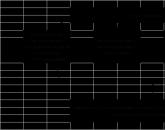Payroll income tax. Paying income tax on wages
Income tax on wages (PIT), its size, calculation mechanism and existing benefits for payers are of interest to all categories of Russian citizens, since the income of each person depends on its application.
VAT: what is it?
Being the main mandatory tax, personal income tax is withheld from almost all types of income of an employed individual, with some exceptions. There is a small list of state benefits and compensations that are not subject to income tax. The tax rate varies from 9 to 35% and depends on the nature of the income. To find out what income tax should be charged from wages, we will deal with the features of its payment.
Residents and non-residents: differences in the tax rate
The law provides clarifications in determining the status of "tax resident", which is necessary for the correct calculation of personal income tax, because the differences in tax rates for different categories of payers are very impressive.
A tax resident is a person staying in Russian territory for a total of 183 days from the last year.
He can be a citizen of Russia, a foreigner or a stateless person, i.e. the status of "tax resident" is assigned to any individual, regardless of his place of residence and citizenship.
It should be noted that the status is determined as of the date of the end of the tax period by summing up the calendar days of the payer's stay in Russia over the last year. The 183-day period includes the days of arrival and departure.
Income tax on the salary of tax residents is 13%. Personal income tax on the income of a non-tax resident payer is 30% of the amount of earnings. The status is established periodically when income is paid, during the year it can change several times.
Taxable income
Income tax is charged on the following income:
Salary accrued under an employment contract or contract;
Dividends of part of the profits to the owners of companies;
Leasing of property;
Realization of property: premises, buildings, cars, securities and shares in companies;
Winnings and prizes;
Material benefit (interest from deposits).
Income tax on salaries and non-taxable income
So, all the main accrued incomes of an employed citizen (salary, bonus allowances, amounts under employment contracts, one-time incentives for loyalty to the company and regional increasing adjustment factors) are subject to taxation.
But there is also a list of payments that are not subject to income tax. Material assistance, alimony for the recipient, pensions, scholarships, lump sums, state and severance payments in case of reduction in staff or compensation for damage from causing injury and other compensation payments are not subject to personal income tax.
Payment of income tax on salaries, rates and determination of the tax base are regulated by articles 210, 217, 218-221, 224 of the Tax Code of the Russian Federation. Income tax is federal. Funds from its payment go to different budgets. The size of the tax to be credited is legally established: 70% are received by the budgets of the Russian subjects of the Russian Federation, 10% - by the budgets of settlements, 20% - by municipal district budgets.
Calculation procedure
Income tax on salaries is calculated in the following order:
The full accrual of earnings for the reporting period is made;
The amount of accrued earnings is reduced by the amount of non-taxable income, if they were accrued;
The status of the taxpayer is determined;
It is established whether the payer has the right to a tax deduction;
The total amount of accrued income is reduced by the amount of the tax deduction, if there are grounds for its application;
From the received tax base, income tax is calculated: a resident pays personal income tax in the amount of 13%, a non-resident - 30%.
tax deductions
Tax deductions play an important role in the calculation of personal income tax, so it is necessary to find out the possibility of their use in calculating income tax. Tax deductions are standard, social, property and professional.
The law establishes standard deductions in the amounts of 500, 1400 and 3000 rubles.
Monthly deduction of 500 rubles. intended:
Heroes of the USSR and the Russian Federation;
Participants of the Second World War and hostilities, retired military;
Disabled people I and II gr.;
Victims of the Chernobyl accident and Mayak, etc.
Parents of the first two minor children are given a deduction of 1,400 rubles for each. It is valid as wages grow and, having reached 280,000 rubles, automatically excludes further action until the end of the financial period.
For a monthly deduction of 3000 rubles. they have a right:
The liquidators of accidents at the Chernobyl NPP and the Mayak Production Association, who received disability or a serious illness as a result of these actions;
Parents or guardians of a disabled child, three or four children;
Disabled veterans of the Second World War and disabled participants in other military operations;
Nuclear weapons testers, etc.
If the payer falls under several preferential degrees, then the highest amount is taken into account, the deductions cannot be summarized. So, for example, income tax on the salary of disabled people is reduced by 500 rubles, but if the disability was obtained during the liquidation of the Chernobyl accident, then the deduction will be 3,000 rubles, not 3,500 rubles. The law obliges the employer to take into account standard deductions, other types of deductions are controlled by the taxpayer himself and are not provided by the company. The exercise of the right to apply deductions is realized by citizens by submitting a declaration of income received to the tax office or by submitting an application for expenses incurred.

Features of the application of the tax
The most common with the amount of earnings is the personal income tax rate of 13%. In addition to it, other tax rates apply for different categories of payers and types of income:
9% - taxation of dividends from shares and own shares of companies;
30% - the amount of tax for non-residents;
35% - personal income tax, which is subject to winnings in excess of 4 thousand rubles, as well as material benefits from interest on bank deposits.
If the taxpayer has children, then the monthly tax deduction for the reporting month is 1,400 rubles each. for the 1st and 2nd imperfect child, 3000 rubles. - for the 3rd and subsequent children.
Income tax on the minimum wage is paid in accordance with the general procedure, since any income is a tax base and is subject to personal income tax.
Single parents (for example, a single mother) are legally entitled to a double deduction of 2,800 rubles, which is applied until the salary exceeds the level of 280,000 rubles. In addition, this benefit ends when the parent marries.

Return of personal income tax
Russian legislation defines a number of conditions when the taxpayer has the right to return the amount of personal income tax paid from wages. This will be a social or property tax deduction. Naturally, there must be grounds for a return. These include:
Buying or building a home;
Mortgage;
Teaching children or their own;
Treatment and purchase of medicines.
To return the tax to the IFTS, it is necessary to submit a package of documents confirming the costs incurred with copies attached to them. It should be noted that the filing of the application takes place in the next financial year after the period in which the expenses are incurred, and in order to receive a refund, income tax must first be deducted from the salary.
Enterprises calculate personal income tax separately for each employee. The tax in the total amount is transferred to the budget. It does not affect the financial result of the company, reducing only the amount of earnings of employees. The organization itself is only a tax agent, acting as an intermediary, collecting tax, summing it up and transferring it to the budget.
Popular
- Bull and bear on the stock exchange: the "animal" face of the stock market
- Stages of opening a private dental office
- How to open your store - step by step instructions for beginners + real life example
- Sales revenue - formula and concepts
- What is the difference between margin and profit - calculation formulas
- Advice 1: How to switch from a simplified system to a system with VAT payment
- The concept of "car depreciation" - what is it?
- Business of yesterday: 7 main problems of modern realtors :: Opinions :: RBC Real Estate
- What is the difference between public and non-public types of joint-stock companies, partnerships and cooperatives?
- Simple business - private household plots (personal subsidiary plots)




